About Us
C/GPU is an organization by, of, and for Caltech Graduate Researchers and Postdocs who want to unionize in order to improve our teaching, research, and employment experience at Caltech. Our work not only benefits the university and the California economy, but also has positive impacts worldwide. We work in many different fields and have varied experiences, but our dedication to teaching and research unites us all.

Ryan Rubenzahl, Astronomy
I’m a 5th year graduate student in the Astronomy department. The Caltech Honor Code states that “No member of the Caltech community shall take unfair advantage of any other member of the Caltech community.” Far too often have I seen and heard my friends and colleagues be abused, bullied, and harassed by their advisors (in some cases having to leave Caltech entirely), and despite our labor being essential to the teaching and research at Caltech, our stipends have not even kept pace with the minimum cost of living in Pasadena. By denying us any real say over our own working conditions, Caltech is not upholding their end of the Honor Code. From the annual GSC recommendations to petitions by groups like BSEC, Caltech for Affordable Healthcare, and GSAN, the single bottleneck to change at Caltech has and always will be the administration’s resistance to change. Collective action as a union is the only way we can address this fundamental power imbalance and win fair working conditions. As part of the nationwide movement unionizing higher-ed, we can finally create an accessible, inclusive academia that is democratically organized by and for its students, researchers, and teachers, rather than today’s academia that is run like a corporation by special interests and trustees.

Simona Miller, Physics
I’m a physics Ph.D student here at Caltech working in gravitational-wave astronomy and data analysis. Being a graduate student in the LA area means often struggling to find affordable housing and food, while being expected to work over 40 hour weeks on research and teaching. We deserve a living wage, better housing, better healthcare, increased protections from workplace harassment, and the many other benefits a union will provide all of us. Forming a union for graduate students and postdocs at Caltech is the best way for us to take the power into our own hands and have a real say in our working conditions.

Fayth Tan, Biology
I am a fourth year graduate student in Biology studying evolution and development. In my time here I’ve seen too many of my peers be failed by institutional structures at Caltech, because none of those structures will ultimately prioritize the student’s best interests over the institution’s. I believe we need an advocacy body that is truly our own— and that collective bargaining through a union is the most meaningful way we can achieve this. A union is the most legally, materially, and organizationally salient means of achieving true autonomy in our working environment. The most equitable Caltech is the one we will build ourselves.

Nikolaus Prusinski, Astronomy
I’m an astronomy graduate student working on galaxy formation and evolution in the early universe. A union at Caltech would help to form a more equitable distribution of power between the students and the administration. This entity would be timely in securing pay commensurate with our services and cost of living, upholding our rights and privileges as student-employees, and maintaining a conducive research environment for all. A union designed by the students, for the students provides the best intermediary through which we may collectively bargain and augment the working conditions for the most students campus-wide.

Susana Torres-Iondono, Applied Physics
Hi friends! I am Susana, a grad student in APh working on photovoltaics. On campus I enjoy playing soccer, tutoring, and taking nature walks. I am interested in forming a union because it will be a great source of solidarity and community. A union is a fantastic way to create a more just and all around enjoyable workplace. I am excited for our comradery as academics to only continue to grow from here!

Abdullah Farooq, Biology
I’m a graduate researcher in biology developing tools to control immune cell activity and migration. At Caltech, graduate researchers are often faced with difficulties accessing quality healthcare, housing, and protection from harassment. I believe that a union is the best way for graduate researchers to negotiate for better working conditions with Caltech by giving us the ability to bargain with the administration. Our work as graduate researchers is essential to the function of Caltech, and we should be treated as such. A union is the best vehicle to help us achieve those demands.

Sam Ponnada, Astronomy
I’m a graduate student researcher working to understand how magnetic fields and cosmic rays impact the evolution of galaxies. Living in Southern California is expensive, and right now, graduate student researchers and postdocs have little concrete say in how decisions about our salaries, healthcare, and benefits are allocated from year-to year. I believe a union is the best route to creating a more democratic workplace that benefits researchers from all backgrounds, helping to close existing gaps in equity and making working conditions better across our institute.
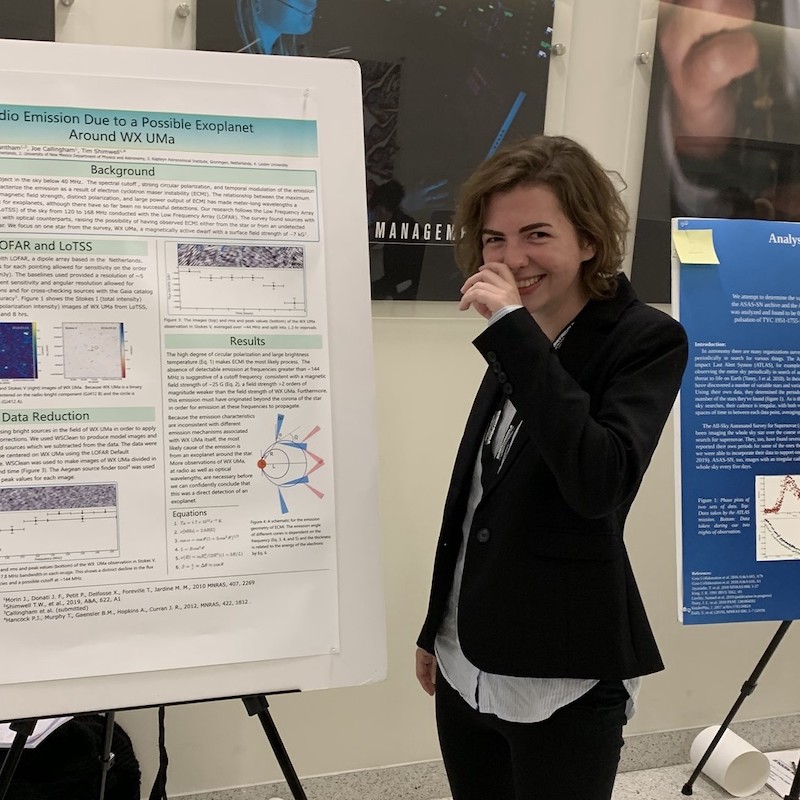
Ivey Davis, Astronomy
I’m a graduate researcher in the astronomy department where I’ve been developing and commissioning instrumentation to use for space-weather monitoring of young, sun-like stars. A union is the strongest way for graduate students to effectively advocate for themselves and make sure their needs are met. Specific to Caltech, it would be the best avenue to demand a salary that actually keeps up with the record high inflation and housing costs in Pasadena so that we can afford to live here. A union also provides the opportunity to address workplace harassment and unreasonable working conditions through a body that is actually invested in our safety rather than the image of the school. This is especially crucial for a STEM-dedicated school where women and gender-minorities are under-represented, often targeted, and just as often neglected.

Varun Wadia, Neurobiology
I’m a 5th year grad student in the neurobiology program, working with epilepsy patients to try and understand episodic memory at single neuron resolution. I think a union is essential for 3 main reasons;
- It provides a voice to the (often) voiceless. Graduate students and postdocs, particularly those here on a visa, are completely at the mercy of their advisors. Most mentors do not abuse this privilege but some do. When it happens there is very little recourse for the affected – HR essentially exists to protect the school, and Title IX often does not get involved. A union would serve as an umbrella, curtailing the power advisors have over our lives.
- A union will create a unified front. Often campus reform initiatives are slowed down by disorganization. Multiple independent student groups will push for the same thing, often without knowing of each others’ initiatives. I have seen the administration use this as an excuse to dismiss students as unprepared. A union will bring together these groups and catalyze reform.
- Administration is legally obligated to engage with a union. Even if we end up agreeing with the administration’s stance on a given issue – they will be forced to explain their reasoning to a union. This is extremely important especially when they make decisions that affect us (eg. increasing healthcare premiums) which they currently do without much explanation.

Isabelle Rosenthal, Computation & Neural Systems
I’m a 4th year graduate student in CNS, and I use human electrophysiology data to understand how tactile experiences are constructed and how they can be artificially generated to help patients with spinal cord injury. The research and teaching graduate students do is essential to Caltech but right now we have no negotiating power relative to the administration. As a consequence, we are forced to beg and hope that Caltech will increase our stipends to a living wage and provide viable healthcare. Students that are harassed, discriminated against, or abused are subject to the whims of their advisors and departments. When dealing with graduate students individually, Caltech can set the rules. A union is the best way for graduate students to require that Caltech take us and our needs seriously. With a union, we can negotiate as a group for better benefits, wages, and protection against abuse.

Korbi Thalhammer, Geochemistry
I’m a 3rd year grad student in geochemistry studying microbes under environmental stress. Unfortunately, stress is something I’ve become personally familiar with at Caltech. In my second year, I attended a field trip run by my division. Because no hazard assessment was conducted, and because we weren’t provided with necessary safety gear, I contracted valley fever (coccidioidomycosis), a chronic illness that has left me with permanent scarring in my lungs (see CT scan above). Nearly a year later, the division has not apologized to the students on the trip and has not informed the student body about this accident. Worse, it has censored student TQFRs warning future students about these poor field safety practices. A union can force the Caltech administration to develop standard protocols for workplace safety in ways that a few sick and injured students cannot. Until we raise our voices together, workplace injuries like this one will continue to be brushed off and swept under the rug.
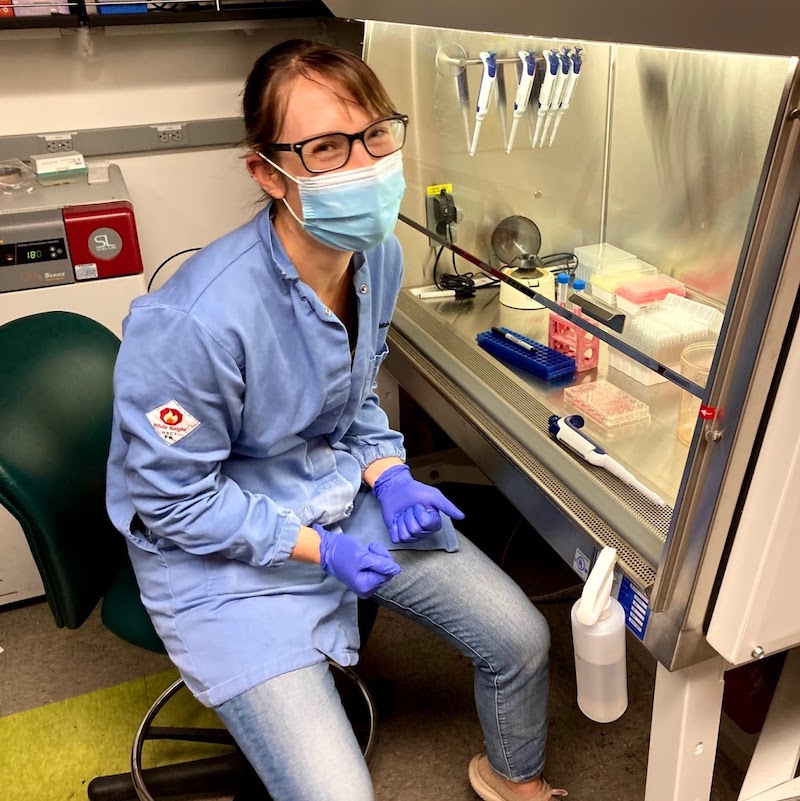
Rachael Kuintzle, Biochemistry and Molecular Biophysics
I’m a BMB PhD student working on developmental systems biology. During more than half a decade at Caltech, most of my friends of marginalized genders have filed harassment or discrimination complaints with Title IX, and precisely zero of them have resulted in any real consequences for the perpetrators or positive changes for the affected individuals. The lack of accountability has driven many of my brilliant friends away from their dreams of academic science careers. It seems that all the administrative institutions currently in place to ostensibly serve graduate students in fact protect only the faculty and administration. There are no true advocates for the well-being of graduate students except graduate students. At other schools, unions have enabled graduate students to involve third-party arbitration in harassment cases, leading to actual consequences for abusers. Why not give ourselves more power to fight for the treatment and compensation we deserve?
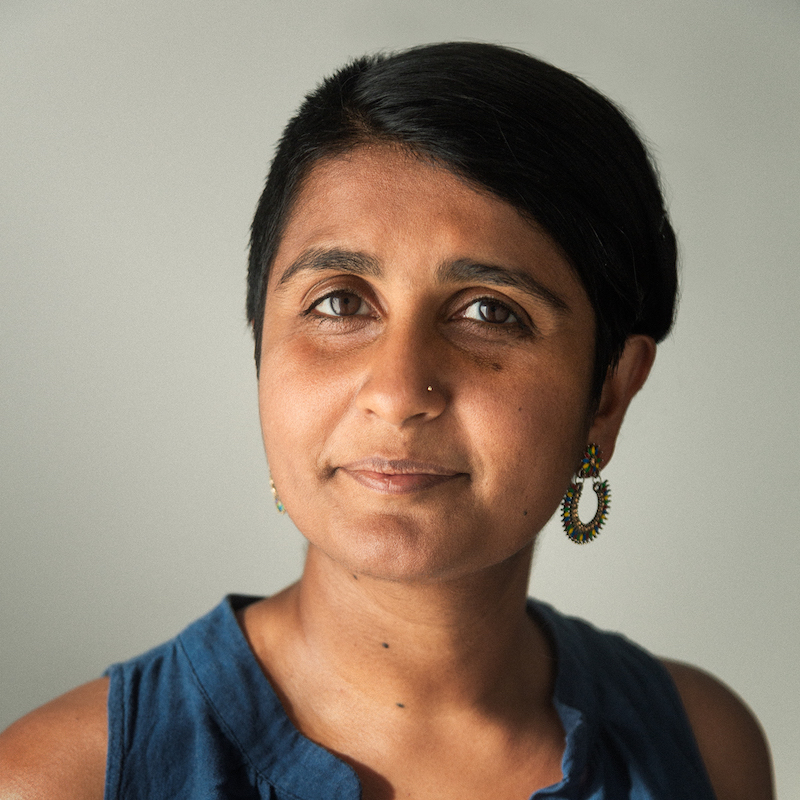
Kriti Sharma, Geobiology
I’m a postdoc studying microbial contributions to carbon cycling and climate change. I fully support a union for many reasons, but the one that really compels me is that I am utterly sick and tired of hearing about grad students and postdocs being abused by their advisors with no recourse. As Chair of the Caltech Postdoc Association Advocacy Committee, I’ve listened to too many trainees tell me their stories about PIs who bully, abuse, and/or threaten them. These trainees go through all the proper channels to try to get some relief (let alone justice, which is entirely off the table!) and they are left frightened and traumatized with no support or options. My colleagues are some of the brightest and most hardworking people I’ve ever met, and they deserve so much better. After years of trying to help trainees navigate the “proper channels”, I’m forced to conclude that a union is the only way to put an end to the employee abuse that is endemic at Caltech. The administration has had years – decades in some cases – to stop sheltering known abusers at the expense of vulnerable trainees. Time’s up.
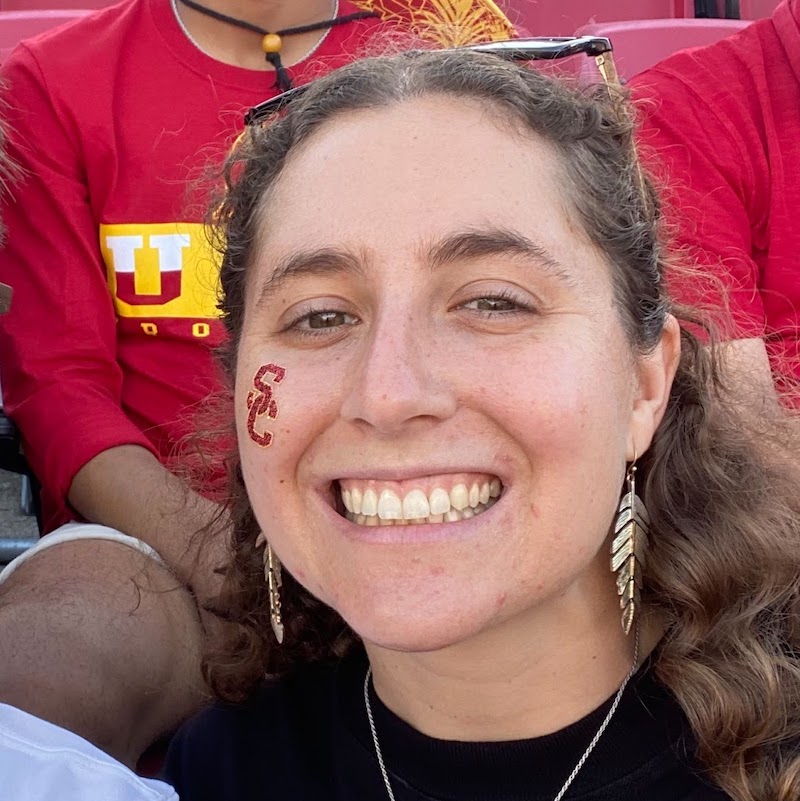
Sarah Blunt, Astronomy
I’m a 4th year grad student studying exoplanet detection and characterization. I’ve really struggled with my mental health over the past few years, a large part of which has to do with my rocky relationship with my adviser. I hope that a union, among all of the other wonderful things mentioned above, will hold the university accountable for the often damaging actions of its faculty.

Kiran Shila, Electrical Engineering
I’m a 3rd-year grad student working in radio astronomy. Coming to Caltech from a big state school in Florida, I was shocked to discover that despite having over 100x the endowment per student and a significantly higher cost of living, Caltech offers similar pay and fewer benefits to its student workers. This difference makes studying at Caltech increasingly challenging for those without a financial support network. I know many people who spend more than half their income on rent – leaving little for food, transportation expenses, etc. To make matters worse, the restriction on outside employment and the limitation of 20-hour work weeks (a metric that is laughably divorced from reality) make subsidizing one’s income practically impossible. A critical difference between my postgraduate academic experiences is the presence of a strong student union. In Florida, our student union worked for fair wages, 100% healthcare coverage for all student workers, and oversight over the university’s labor practices. I feel more vulnerable at Caltech without a student union’s legal protection and representation. Now is the time for us to unite and fight for what we deserve.

Dan Utter, Geobiology
I’m a postdoc studying microbial ecology and evolution at seafloor methane seeps. I want a union at Caltech because we need an institution that advocates for us to stay on equal footing with the institution that is Caltech. Here and elsewhere, I’ve seen how status quo works well when all is well, but also how it falls apart when conflicts arise, and how the voices with less power are drowned out. One-off heroic actions of support from fellow workers, faculty, or administrators is not a solution to this problem; we need a counterbalance to achieve a meaningful correction. This is what I hope a union at Caltech can achieve.

Isaac Legred, Physics
I’m a 3rd-year grad student studying gravitational waves and neutron stars. I really love what I get to do everyday, and for me, building a union is a way to protect this and give others the same opportunities even if they have different life circumstances. Having the dignity of being able to come to the university from a place of solidarity is what builds a stronger community in the long run. It’s insane to me that the university can make unilateral decisions which currently can’t really be challenged (for example, threatening to evict people for missing covid tests, or giving “raises” which actually lower our real earnings). This represents a posture that we can meet head on, so that everyone who contributes here is given a voice.
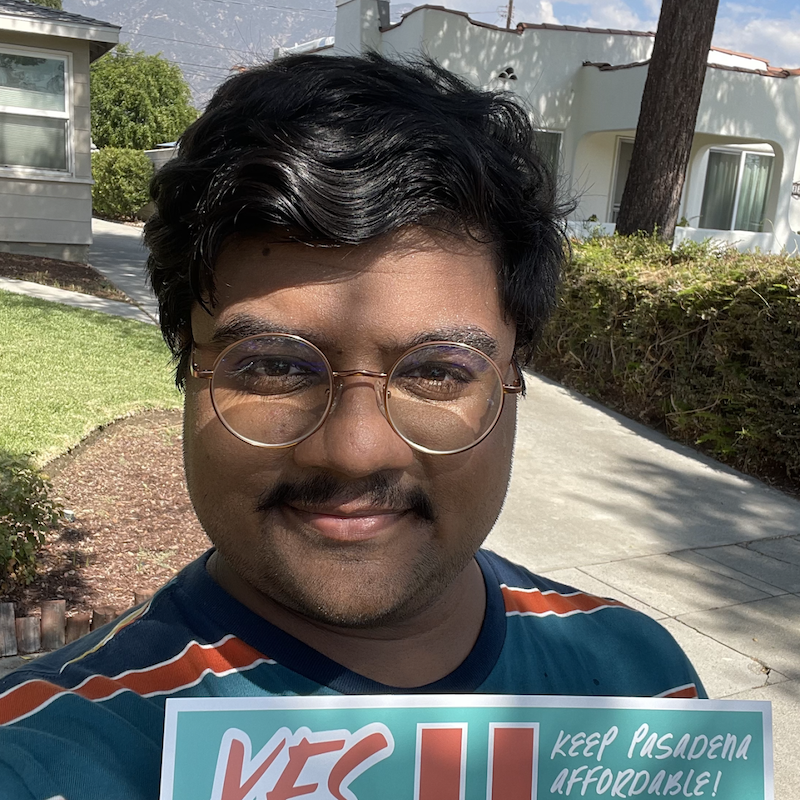
Ashay Naren Patel, Physics
I’m a 5th-year grad student building a precision search for new particles and forces using trapped polyatomic molecules. I have been organizing for better conditions for working Pasadenans for a few years now, most notably with Socialists of Caltech, Pasadena Tenants Union, and Caltech for Affordable Healthcare towards improving the graduate student health insurance plan. Through that advocacy, we leveraged the sentiments of a large mass of graduate students to push forcefully for improvements to our health benefits. Even so, at times we were forced to work through Caltech’s “official channels,” which served little purpose other than to waste our time as organizers, though we ultimately won our demands after a year and a half of pressuring the administration. A union is a much more effective means to force Caltech to improve our conditions, because it would leverage our collective power as workers who make this institution run. Pay, benefits, racial and gender disparities, anti-harassment and anti-racism–a union is the perfect tool through which we can make change at Caltech and beyond. We are workers in solidarity with each other, and every worker deserves a union.

Ruby Byrne, Astronomy
I’m a postdoctoral scholar studying cosmology and early galaxy formation with low-frequency radio telescopes. As a graduate student at the University of Washington, I was a union member and steward with UAW 4121. I saw firsthand the importance of unionization for academic employees, from negotiating wages in the face of unprecedented cost of living increases in Seattle to providing robust, accountable processes for resolving workplace issues such as sexual harassment and untenable workloads. Thanks to my union, I had excellent health insurance as a graduate student. This meant that I could properly take care of myself throughout grad school—I was free to worry about my thesis and exams rather than stressing about affording healthcare. I knew that if I experienced harassment or unsafe working conditions, I would be protected by a legally-binding contract and a union that prioritized my well-being over the institution’s reputation. At Caltech, the administration lacks accountability because academic workers do not have power to bargain or enforce a fair contract. Caltech workers deserve a seat at the bargaining table.

Natasha Reich, Chemistry
I’m a second year graduate student studying decarbonized energy systems and light-directed growth of semiconductors. Unions are great, we should have one.

Joshua ‘Quinn’ Morgan, Applied Physics
I’m a 2nd year graduate student in Applied Physics. I study magnetohydrodynamics and plasma, specifically instabilities and wave interactions in MHD plasmas. I believe strongly in the power of collective action to hold institutions accountable, especially in securing compensation for damages and getting serious issues like Title IX infractions and harassment properly investigated and treated with respect. Further, unionization secures greater leverage in maintaining pay that raises commensurately with inflation and keeping healthcare accessible. Together, as a community, we can secure a better workplace through unionization.
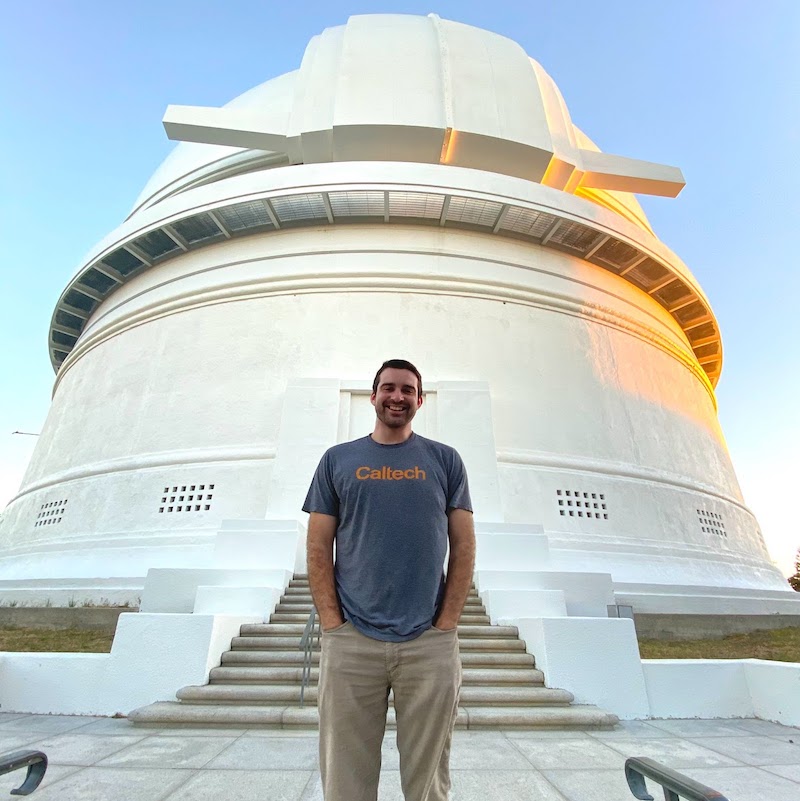
Mike Greklek-McKeon, Planetary Science
I am a 4th year graduate student studying nearby Earth-sized planets around red dwarf stars. Forming a union is the only way for graduate researchers and postdocs to negotiate on equal footing for fair wages, better benefits, and protections for safe working conditions. Without CGPU, we are doomed to the same cycle of the Caltech administration stringing us along on miniscule salary increases, poor benefits, and no workplace protections. United we bargain, divided we beg.

Ranjani Murali, BBE
I’m a postdoctoral scholar in BBE, who works on understanding how microorganisms in deep-sea ecosystems live. I am also fascinated by the evolutionary paths that microorganisms took to reach their current biochemical potential. I believe in having a community of peers who help and support each other through difficult times. I’ve learnt from experience that it takes more than a few instances of good will to create good working conditions. Collective bargaining is the best way to ensure our rights and those of the most vulnerable of our colleagues. This is why I support the formation of a union.
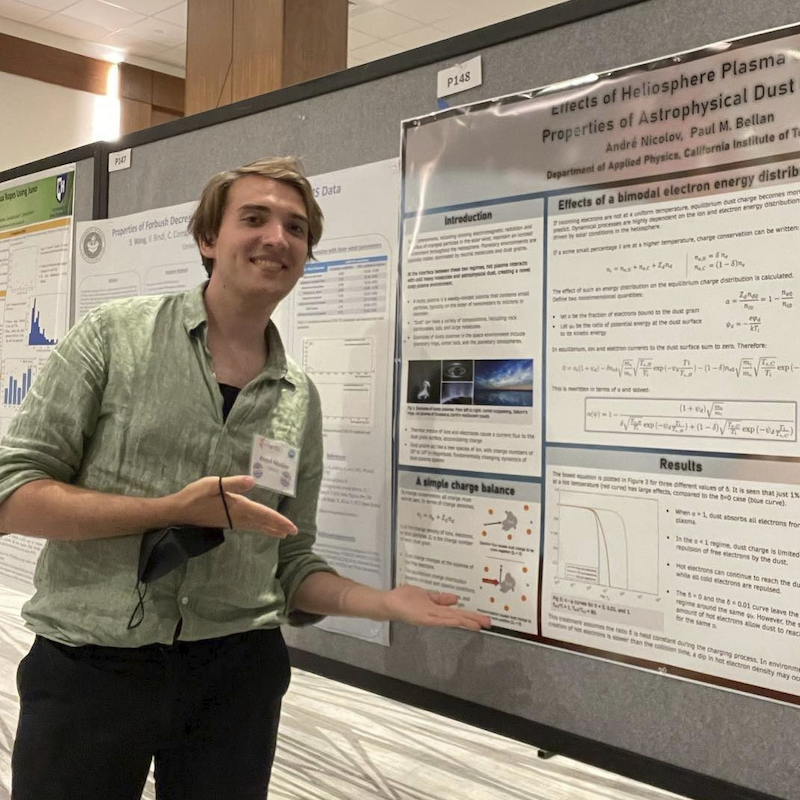
André Nicolov, Applied Physics
I’m a 4th year graduate student, studying the formation and behavior of astrophysical dust in plasma environments. I support forming a union to ensure our graduate and postdoctoral workers have the voice and power to advocate for our workplace safety and academic environment. It gives us the legal ground to stand up to academic abuse, discrimination, and harassment, to advocate for our own healthcare, and to bargain for fair and livable wages, rather than depend for our livelihoods on the institution’s false promises and minimal change.

Emma Cosner, Chemistry
I am a first year graduate student going to research sustainable energy technology. Forming a legal entity of graduate students and postdocs is the only way to achieve equality with our administration. Our students are passionate and determined, both in and out of the lab, and I have no doubt that nothing will stop us from achieving our goal of unionization.

Ruolin Deng, Geology
I’m a 4th year PhD student in Geology at Caltech and my research interests include noble gas in interplanetary dust particles and carbonate-induced melting processes in the upper mantle. Forming a union means equipping graduate students and postdocs with the most powerful tool to defend our rights and argue for our benefits. During my time here, I have personally experienced threats to my safety and health on an improperly planned field trip, after which it also turned out to be extremely hard to acquire an acknowledgement of the incident on a divisional or institutional level. I have also witnessed my cohorts struggling when they were treated improperly and yet had no way to defend themselves. Some of whom ended up leaving Caltech. A union will provide one with legal ways to defend ourselves and talk to the administration equally when things like these happen again.

Jessica Jacobs-Li, Biology
I am a 2nd year graduate student at Caltech studying the development of the enteric nervous system. I believe that systemic issues in academia create shared risks of abuse and exploitation that are even higher for vulnerable communities. A union will provide a much needed avenue for us to challenge these systemic issues, improve our working conditions, and protect the most vulnerable among us. I am excited to join this diverse coalition of Caltech graduate students and postdocs fighting with one voice for better wages and working conditions.

William Denman, Chemistry and Planetary Science
I am a 6th year graduate student in CCE and GPS, looking at the surface composition of Galilean satellites. Academia, as an institution, has a severe power imbalance between graduate students and faculty. In my time at Caltech I have seen surveys showing that graduate students are severely rent burdened and found that many of us skip meals due to financial reasons – yet we are prevented from picking up supplementary income due to the nature of our contracts and the nature of our work. Not to mention that during my time here, our health insurance has increased in price and changed providers multiple times forcing students to change doctors. I have also witnessed students who have felt helpless in their relationship with their advisor. If your advisor decides they do not want to pay you, you are done as a graduate student. You will have nothing to show for your time here and will not have the financial means to support yourself in the interim. When students have brought complaints, administration sides with the professor in almost all instances, leaving students on their own. Caltech administration seems to lack insight into many of the situations that graduate students deal with. A collectively bargained union contract would go a long way towards protecting and helping graduate students.

Talya Klinger, Physics
I am a first year PhD student and research assistant in Physics working on numerical simulation of black hole binaries and gravitational-wave data analysis. In my short time at Caltech, I’ve already seen my fellow students endure abuse from research supervisors and suffer injuries due to inadequate lab safety measures. Something needs to be done, and I believe collective bargaining is the way forward. With a union, graduate students and postdocs will be able to hold Caltech accountable for harassment and workplace injuries, fight for better healthcare and a wage that matches the rising cost of living, and create a safe and productive research environment for all of us.

James Williams, Electrical Engineering
I am a 3rd year graduate student studying nonlinear photonics and quantum optics. As workers, we all deserve a living wage and a healthy work environment. Caltech has failed us in both of these aspects, but by coming together and forming a union, we can use our collective strength to win better pay, better benefits, better working conditions and protect all of us from abuse and harassment. United we bargain, divided we beg.
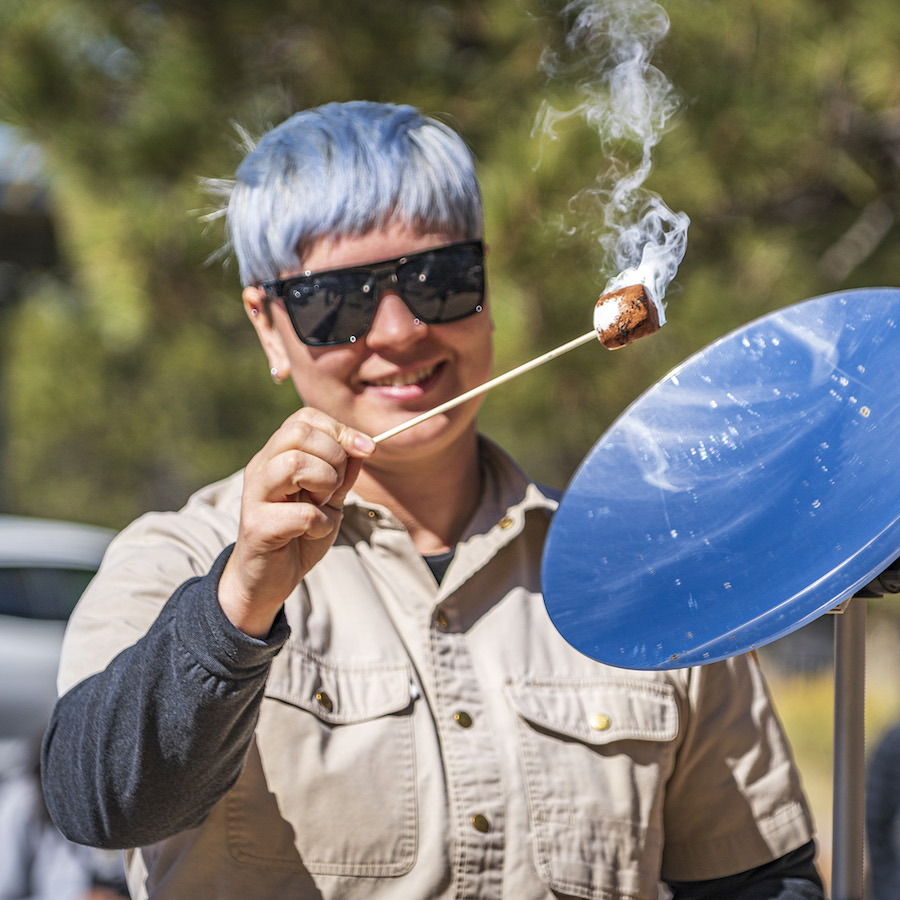
Delaney (Dee) Dunne, Astronomy
I am a 3rd year graduate student in astronomy, where I use a dedicated radio telescope to map out the fuel for future star formation in distant galaxies. I’ve been extremely fortunate in my time at Caltech – both my research group and my fellow grad students have been excellent to me – but grad students shouldn’t have to rely on luck to have a good working environment. I’m working towards unionization because it’s the only reliable way to ensure that grad students have a say in our own working conditions. Without a union, even the protections we currently have are precarious, and could be revoked at any moment. CGPU will ensure that we can meet with Caltech as equals, and help us fight for a future in which all labor is respected.

Thomas Naragon, Chemistry
I’m a 7th year in chemistry at Caltech studying the chemical ecology of eusocial insect symbionts. Having spent a quarter of my life at Caltech, I have grown accustomed to Caltech choosing to preserve its own interests and image to the detriment of its graduate student and postdoc workers. These issues are not unique to Caltech and, understandably, academic workers across the country have been forming unions to force their institutions to take their concerns seriously. These unions have improved the working conditions of graduates and postdocs at these schools and, in spite of the messaging from the Caltech’s administration, I believe that CGPU will measurably improve the experience of workers at Caltech.
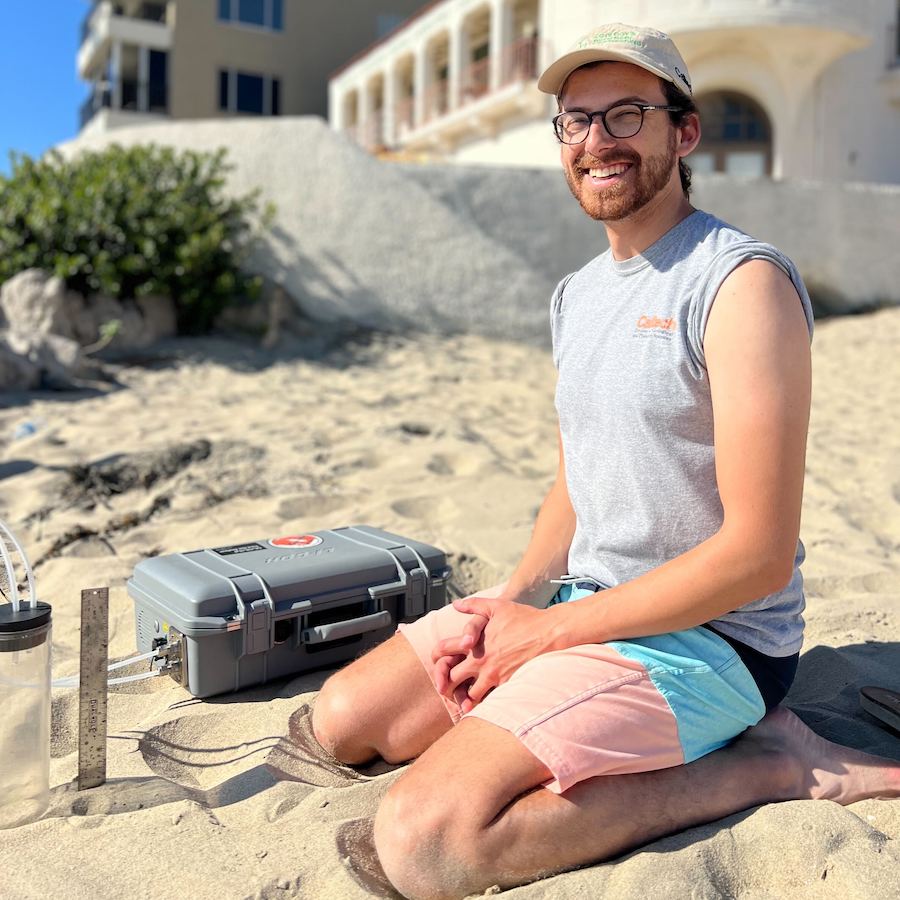
James Mullahoo, Environmental Science and Engineering
I’m a 4th year graduate student in Environmental Science and Engineering (ESE) studying marine microbiology. After many several years of global upheaval, it has been disheartening to see how the place that we spend so much of our time and energy has failed to support us. While many of us may have strong, positive relationships with faculty and mentors, having protections against the threat of retribution and mistreatment can preserve our sense of wellbeing and serve as a bulwark against future issues. Watching my peers go through the arduous and ineffective channels that currently exist shows how much room there is for us to build a better system that truly supports us at every level and ensure that our voices are not only heard but acted upon. The power of collective action through a union can win us this and more (i.e. better healthcare, improved wages, support for international students), and I’m proud to support these efforts.

Jack Wilding, Geophysics
I’m a Ph.D. student in geophysics using seismology to study volcano processes and structures. At Caltech, students hone their expertise and develop as researchers alongside leading scientists; working here can be an extraordinary experience. I’m pro-union because I believe this experience should be made available to all of our researchers, without having to worry about the cost of living in Pasadena, the affordability of healthcare, and the safety of our workplace. Presently, too many of our colleagues shoulder the burden of these concerns. Until we can collectively bargain with the Caltech administration, our standards of living will continue to grow more precarious year after year. By unionizing, we can ensure that our generation and future generations of Caltech researchers are able to work and study to their full potential in an inclusive, supportive, and safe environment.

David Abramovitch, Applied Physics
I’m a 3rd year graduate student in Applied Physics studying transport in materials with entangled electrons. Living with a chronic illness, Caltech threatens my and fellow workers’ needs by cutting healthcare benefits, failing to provide paid medical leave, and forcing us to rely on the institute’s good will for disability accommodations and workplace protections. Unions in higher education have a strong track record (link https://www.fairucnow.org/uaw2865-sru-contracts/) of securing good healthcare, paid medical leave, and effective grievance processes. By forming a union, we will unite Caltech grads and postdocs to bargain for the needs of every worker: from wages and healthcare to workplace protections and grievance processes prioritizing workers’ needs.

Himanshu Chaudhary, Physics
I am a 4th-year graduate student in Physics, mostly working on codes to simulate binary black hole collisions. I think we need a union in Caltech because it will give the grad students more say in things that affect their day-to-day lives. A union provides a democratic way for every grad and postdoc to express their needs and issues. Right now the only way to change anything is by requesting the higher authorities, who are under no obligation to actually do anything. A union provides a weight to these voices, it allows for a more fair and reasonable discussion between the administration and the students as equals. A lot of us are very privileged to have guides and peers who encourage and support us, they enable us to do well in both our professional and personal lives. But unfortunately, not every student at Caltech is so lucky. A healthy and encouraging work environment should not be a privilege, there should be safety nets to ensure that nobody is getting taken advantage of, a union is that safety net.

Kyle Nelli, Physics
I’m a PhD student studying gravitational waves and writing software to simulate two black holes colliding and merging. I believe forming a union at Caltech is the best course of action for graduate students and postdocs because we are the heart and soul of research that comes out of this institution. And as such, I believe we are entitled to fair compensation, safe working conditions, and respect from our advisors and Caltech administration.
